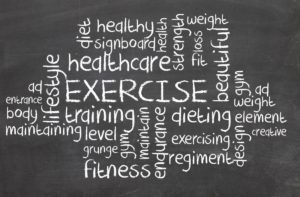 Exercising is a habit that every person could benefit from. Although not every form of exercise is the same. Despite the long list of positive reasons, we still manage to find excuses for not exercising.
Exercising is a habit that every person could benefit from. Although not every form of exercise is the same. Despite the long list of positive reasons, we still manage to find excuses for not exercising.
This choice can develop into a pattern, and that pattern can throw someone’s whole sense of wellbeing into confusion.
Being healthy is about a combination of actions that relate to the various aspects of how a body functions.
Nutrition, physical activity, proper treatment of diseases, and mental stability are the primary facets of the basic needs for a healthy life.
Still, there are even more things a person can do in order to be healthy and happy.
Everybody is Different
 Exercise is not something that should be avoided. Every body type is different and requires a personal approach to fitness.
Exercise is not something that should be avoided. Every body type is different and requires a personal approach to fitness.
Something that may work for one person may not work for another. So accepting that is essential for being comfortable with exercising.
Looking into the options when it comes to selecting a fitness routine is necessary.
You might want to allow opportunities to present themselves and try them all to see which best fits your circumstances.
There is no real rush to finding a comfortable exercise routine as long as physical activity is being experienced.
The difficulty occurs when uncertainty and personal expectations hold one back from exercising.
Trust yourself to know your body. You should also trust yourself for not understanding the exercise routine or for not being capable of performing it.
There are modified versions of almost every at-home exercise and gauged intensities for most gym equipment.
The expectations you have are not taught by the objectives but rather by personal judgment. Remove that factor and accept that everyone is different.
Application of Accountability
The application of accountability is genuinely a challenging component to include within an exercise program.
This can be accomplished in a few different forms. The first suggestion applies if you are a people-orientated person.
If the views of others and a sense of community impact your decisions, join a group focused on your niche of exercise.
Maybe a running group, a yoga group, a dance group would be fitting, or even just a community fitness meet.
 Community fitness meets are generally focused on subsets of the population, such as “over 50” or “women”.
Community fitness meets are generally focused on subsets of the population, such as “over 50” or “women”.
However, generally, everyone is welcomed to participate in the exercise program.
The second suggestion for strategically applying accountability to your fitness regimen is to work with a fitness coach.
You will find that a fitness coach is going to motivate you. They most likely will reach out to you regularly to discuss your progress, and will help you manage goal-setting.
There are virtual programs that include these assets to fitness, which have designated workouts.
Finding someone local though would allow for face-to-face meetings and experiences, giving the coach a better idea of your immediate needs regarding exercise.
The third suggestion applies to people who are self-starters at heart but are struggling with fitness for personal reasons.
It is possible to have a set of reminders within your home. You can create alarms on your devices for upcoming workouts and commitments to exercise.
Or you could leave yourself notes for the next day (under your water bottle, maybe). These are all strategies for remaining aware of what your expectations are for yourself.
This is the harder of the three suggestions because it requires you to feel the obligation to yourself.
It may already be a struggle when trying to avoid any form of exercise, but it is a beginning.
Finding the Middle Ground
 Finding a middle ground can be a challenge.
Finding a middle ground can be a challenge.
There is a safe spot somewhere between putting pressure on yourself to exercise.
Although getting to the gym is important, struggling to forgive yourself for missing a workout is not going to encourage you to exercise.
The ideal feeling will be a sting of guilt with a bit of optimism, which will allow for the development of motivation.
The middle ground is inspiring, and it is here that you discard the excuses for not exercising.
A Daily Plan To Get More Exercise
It is not as easy as it sounds to commit ourselves to exercise every day.
Yes, we may make an entry in a journal or on the calendar, and we may even prepare ourselves the night before.
However, when we get up in the morning we somehow lose ourselves in the same bad habits as we experienced the day before.
Unfortunately, we are creatures of habit, and finding excuses for not exercising is pretty normal. However, if you want to live your best life, exercise is important.
Here are some easy-to-follow yet effective ways to implement daily movement into your routine:
Practice Mindfulness at the Start of Your Day
 You can start your day with journaling, breathing exercises, meditation, affirmations, or just having an internal conversation with yourself to get started with exercise.
You can start your day with journaling, breathing exercises, meditation, affirmations, or just having an internal conversation with yourself to get started with exercise.
There is a lot of benefits from using mindfulness instead of trying to avoid thinking about changes you want to make in your life.
Practicing mindfulness first thing in the morning is a great way to stop finding excuses for not exercising.
It will in fact help you to focus on some form of exercise from the start of your day.
A more clear-minded approach provides a sense of personal motivation.
Set Small Daily Goals and Include Rewards
 This can be difficult for two reasons. One it is hard to determine what goal best fits into your day. And, two, it is hard to narrow down a reward that will motivate you.
This can be difficult for two reasons. One it is hard to determine what goal best fits into your day. And, two, it is hard to narrow down a reward that will motivate you.
However, it has been found that this habit is actually one of the most effective ways to motivate yourself.
This habit requires us to look within ourselves to determine what is the best way to spark motivation.
Does it suffice to bargain with television time if you are still consuming hours of television? Probably not.
Does it suffice to offer yourself a glass of wine for an accomplishment if you don’t drink often? Potentially.
This part of proactive planning is entirely personal, but that doesn’t revoke its potency and simplicity once a reward system is established.
This is done via either understanding your own desires or removing things that are enjoyed in your life and using them as a reward.
Create a Way to Hold Yourself Accountable
As adults, we are responsible for our ability to focus on our goals.
If we don’t provide ourselves with a sense of personal discipline, then we are not doing the best we can for ourselves.
 Being personally accountable for our physical activity takes more effort than we recognize at face value.
Being personally accountable for our physical activity takes more effort than we recognize at face value.
There are external ways to apply that pressure, such as joining social groups that are focused on physical activity or planning your own social gatherings, such as a nature walk with friends.
Using your technology to your advantage. Some applications can limit your time on social media or websites to help promote less screen time.
This is a way to remind you of how long you’ve been distracted from exercising at the moment.
Some applications will remind you to get up and walk, or even just stand, such as what is available with the Apple Watches.
By utilizing a health tracker of some sort can be someone’s best bet for noticing sedentary behavior.
These three concepts are a great way to begin planning daily movement.
Applying them to your daily schedule will take time and patience, especially with yourself.
Why We Quit Our Exercise Plans And What We Can Do About It Video:
By working towards healthier habits and more movement, you will bet so many benefits in the long run.
Exercise can play an important role in the longevity of your life.
Using excuses for not exercising may not be simple to resist but having the right approaches can help get you started.
Who knows, you really like to exercise!





